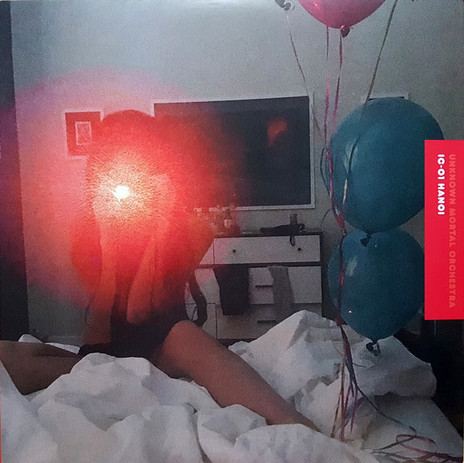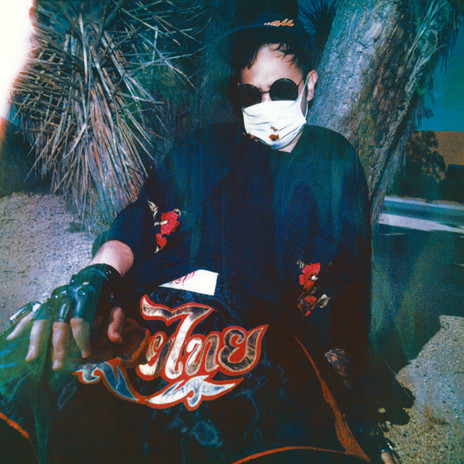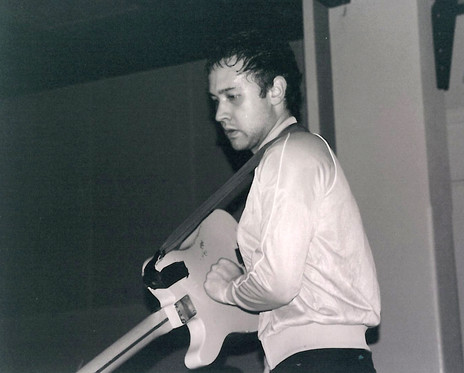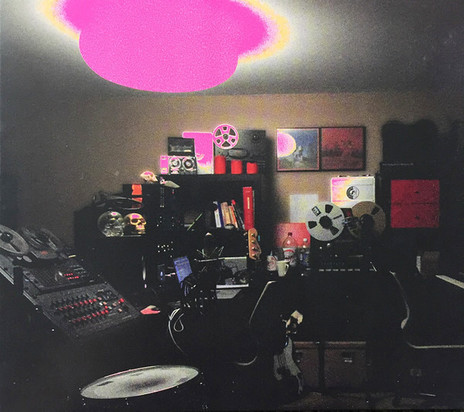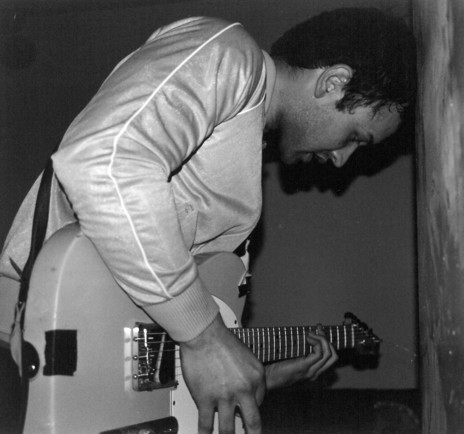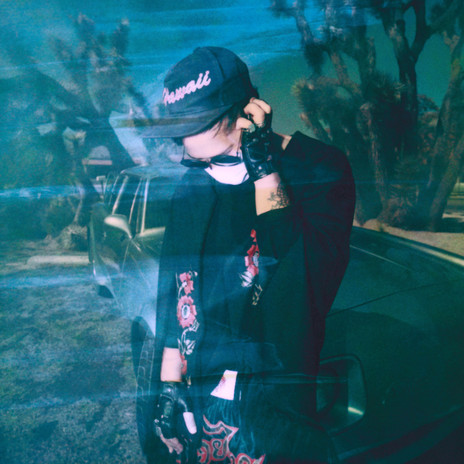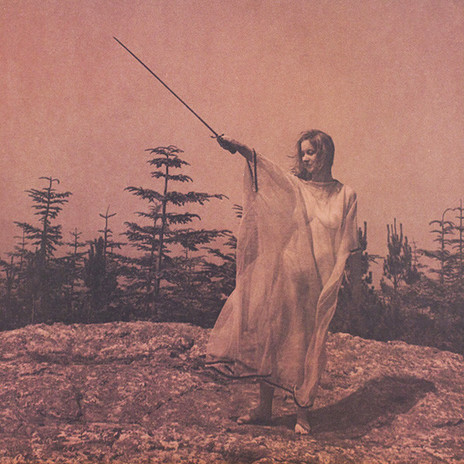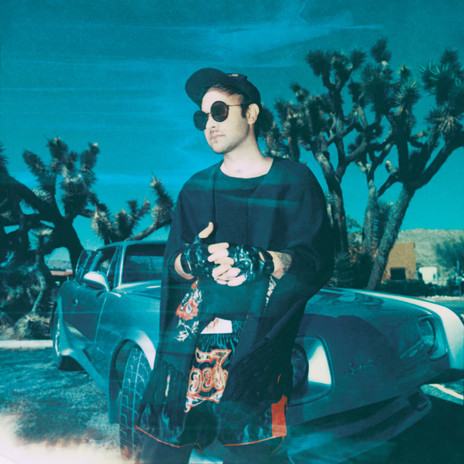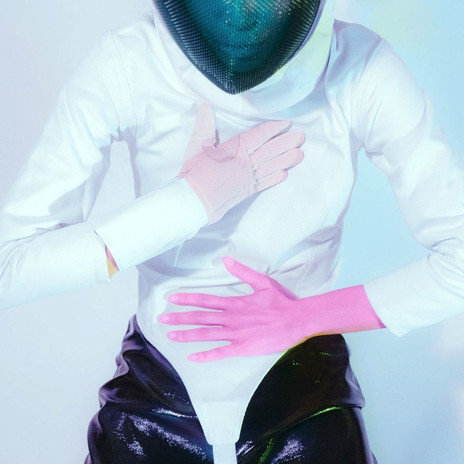When his brother Kody formed The Mint Chicks, Ruban decided his rudimentary guitar skills would be sufficient for the punk-influenced act. However, Ruban wasn’t satisfied to simply coast as a guitarist and spent long hours of his free time learning scales and figuring out songs that he admired, with his hobby soon turning into an obsession.
Between 2001 and 2010, The Mint Chicks turned from cult legends to a popular act widespread acclaim within New Zealand – their 2007 album Crazy? Yes! Dumb? No! went gold, the group won five awards at the following year’s NZ Music Awards, and their final album, Screens (2009), reached the Top 10 of the album charts. However, working together creatively led to a fractious relationship between the brothers in the group and despite their success they went their separate ways.
From unknown to indie heroes
Ruban was living in Portland, Oregan, when he first started work on the home recordings that would launch UMO. The Mint Chicks had moved there as part of an attempt to break the US, since both brothers have US citizenship through their Hawaiian mother. Ruban and his wife had returned there after the band had broken up, but with very little money they took up an offer to rent a yurt in Milwaukee, owned by the midwife who had birthed their daughter. Ruban’s primary occupation was as an illustrator at a film production company, but he continued making music in his free time.
He wanted to make music that sounded as if it was fuzzy hand-me-down from a different era, so he experimented with dictaphones and a reel-to-reel tape machine to get his own distinctive sound (before mixing it down on Pro Tools). The beats were often upfront, but slightly distorted with echo-laden psych guitar and vocals that receded into the background (with melodies that nonetheless cut through). He put one of these tracks, ‘Ffunny Frrends’, up on Bandcamp and sent it to a few places in the hope he might gain enough encouragement to record more.
Instead, the song became a true viral sensation, racing across the mp3 blogs, before being lauded by the biggest online influencer of the time, Pitchfork, in May 2010. Ruban’s first inkling of this rise was hearing his own song being played by a workmate at his graphic design office and being told that it was by a hip young unknown act – he’d released it just six days earlier. He followed it with the single ‘Thought Ballune’, though gradually people at home were beginning to become suspicious given that the original emails were from a person named Ruban from Portland in the US, and that Flying Nun seemed to be involved.
Slowly word spread about who was behind UMO and Ruban found himself being courted by indie labels across the world. Well-connected UK label Outsider Art put out a seven-inch by the band which got them noticed by the music press in London, and UMO eventually signed with Fat Possum Records. Their self-titled debut, released in June 2011, took the feel of upbeat soul, but put it through the filter of psyched out guitar music, sounding like a lost demo tape of early Pink Floyd trying to play James Brown.
Their 2011 debut album sounded like a lost demo tape of early Pink Floyd trying to play James Brown.
The third single, ‘How Can You Luv Me’, showed just how funky UMO could get. Pitchfork gushed over the album, giving it an 8.1, and it featured on many best-of-the-year lists by publications such as NME, Consequences of Sound, and Uncut. The following year, the album was awarded the Taite Prize (for exceptional independent releases) and Ruban was named best male solo artist at the NZ Music Awards (though he was beaten by Kody’s new group, Opossom, in the best alternative album category). UMO spent much of this year touring the world, including a long run of dates supporting Grizzly Bear. Their growing acclaim led them to be signed to a new label Jagjaguwar (Bon Iver, Dinosaur Jnr) in September of that year.
The touring lifestyle often left Ruban lonely and disconnected, which was a feeling that fed into his songwriting. New single ‘Swim and Sleep (Like A Shark)’ captured a desire to hide away from the chaos of the world (it struck a chord with Courtney Love, who tweeted the song to her followers with the message: “Kids check this out.”). Ruban and his wife were able to get a house in the same area of Milwaukee where they had lived previously, so the album was recorded in his basement and simply titled II (2013).
Ruban played most of the instruments himself, though Kody played drums on half the tracks and their father, Chris, also added horns to ‘One At A Time’. The standout track on the album was ‘So Good At Being In Trouble’ which sounded like a classic soul track stripped down to the essentials of drums and guitar, with Ruban’s understated vocals drifting over the top. (A subsequent cover by local soul singer Tyra Hammond proved how well it could work as pure soul.) This song also led to UMO making their television debut on Late Night with Jimmy Fallon and it went on to be their most streamed song.
UMO’s reach extended throughout 2013 – music channel Fuse TV had named them a “must-see” artist at SXSW and they’d played big festivals in Europe such as Roskilde, Pukkelpop, and Lowlands. Back home, they were awarded “best alternative album” at the NZ Music Awards. Yet with many changes in line-up – and a turnover of three managers in roughly the same amount of years – there was still a question as to whether UMO could be turned into a sustainable act long term. Fortunately, Ruban was ready to switch from expectations once more.
The breakthrough of Multi-Love
The story that overwhelmed coverage of UMO’s third album, Multi-Love (2015), hinged around an aspect of Ruban’s personal life – the polyamorous relationship between him, his partner, and another woman referred to only as “Laura” (not her real name). Ruban had met Laura while on tour in Tokyo, then again at a UMO show in Australia, before beginning to keep in touch with her online. He assumed this wouldn’t be a problem, since she seemed to be dating a woman at the time. When Ruban’s partner, Jenny, also befriended her online, the three decided to live together.
The joy and challenges of this unconventional relationship spread across the tracks of Multi-Love, including even its title and cover image (a shot of Ruban’s basement studio taken by Laura). The song ‘Can’t Keep Checking My Phone’ recounts a time when Laura had to leave the country to renew her visa and Ruban struggled with feelings of distance from her.
The album also goes beyond this singular subject matter and shows UMO pushing into new territory. Ruban spent time experimenting with vintage synth sounds and his brother Kody had even more input than previously (his first instrument was piano). The brothers shared writing credits on four songs and Kody contributed both keyboards and drums to a majority of tracks. Their father also added crucial horn parts to the tracks ‘Necessary Evil’ and ‘Extreme Wealth and Casual Cruelty’. Though there was plenty of Ruban’s trademark fuzz-guitar too, especially on the chorus of the epic album closer, ‘Puzzle’.
The album 'Multi-Love' showed UMO pushing into new territory.
The result was a set of songs that sounded more full of ideas than ever before and which could no longer be written off as “lo-fi” in any way. Pitchfork acknowledged it as his “most accomplished” work and Rolling Stone described him as “coloring outside the lines for a vibrant vision of connection”. In the UK, The Guardian and The Observer newspapers both gave it four stars, while Line of Best Fit awarded it 9/10.
Longtime bass player Jacob Portrait contributed on some tracks as engineer and co-producer – and co-wrote one song. This created a more secure core to the band when the pair headed off on their next extensive world tour, along with drummer Riley Geare and keyboardist Quincy McCrary. During this time, they also appeared on Late Night with Seth Meyers (performing ‘Multi-Love’) and did a pacey, ultra-funky version of ‘Can’t Keep Checking My Phone’ on Conan O’Brien with Connan Mockasin and former Mint Chicks drummer Paul Roper as guest percussionists.
They gained new acclaim at home with Ruban and Kody being given the country’s most prestigious songwriting award, the 2015 APRA Silver Scroll for ‘Multi-Love’ – and UMO again won best alternative album at that year’s NZ Music Awards.
The album continued to gain fans worldwide over the years that followed, eventually racking up over 100 million streams (and counting).
New freedoms on Sex & Food
The growing success of UMO meant that Ruban was far beyond the need to simply record in his home studio to keep costs down. He decided to take advantage of his new freedom by recording his next album at a set of different locations across the world, taking a mobile recording set-up with him.
Ruban initially returned to New Zealand to do some sessions with Kody, before heading to Reykjavik in Iceland, via Portland. Next he took inspiration from David Bowie and Iggy Pop’s time in Berlin (close to separation of East and West) and decided he’d find the modern equivalent by setting himself up near the demilitarised zone between North and South Korea – which turned out to be a K-Pop studio in Seoul.
All this travel didn’t always go smoothly. Ruban and Jacob Portrait were in Mexico when an earthquake hit, and both had been relying on credit cards – which were now useless – to pay their way. They found themselves gathered with others in a field where authorities eventually began giving out food. After adjusting to their circumstances, the pair helped out with the distribution of items to the elderly who were trapped there. After 24 hours things returned to normal and they were able to plan their return to the US.
The most fruitful trip during this time was a stint in Hanoi, Vietnam, where Ruban had brought together Kody, his father Chris, and Portrait. He’d been inspired to see how the country compared to his warped view of it through the Vietnam war movies he’d seen as a child. This also led him to rediscover the classic rock that had featured in movies and he filtered some of these influences through to the resulting album.
One prime example is ‘Major League Chemicals’ where Ruban and Kody were jamming in the mode of Jimi Hendrix and Mitch Mitchell – wah-wah guitar over a rollicking drum pattern. In fact, the album overall saw Ruban returning to a big guitar sound on many tracks, with first single ‘American Guilt’ driven by an upfront, no apologies riff which Ruban sang along to.
Yet Ruban also saw there was freedom in the fragmented nature in which people listen to music in the digital era. Often a single song might reach a listener rather than a whole album, so he was happy for the album Sex & Food (2018) to cover many genres, with the idea that the individual songs might find their own audience.
Neilson saw there was freedom in the fragmented way people listen to music in the digital era.
Alongside the hard rock tracks, they also recorded a folky piece, ‘Chronos Feasts On His Children’, with the lyrics based on experiences in Vietnam, which were used to represent the idea that each moment is lost in time. There was also the indie disco of the previous album on ‘Everybody Acts Crazy Nowadays’ and moments of soul on tracks such as ‘Not In Love We’re Just High’.
‘Hunnybee’ – the breakthrough track from the album – was different again, starting with strings before breaking into a slinky guitar line over a busy backing rhythm. The song was inspired by Ruban’s daughter (its title is taken from her middle name) and his vocals had an unexpected sweetness on the track. It was the track that proved his point – reaching beyond the band’s core fanbase to rack up 50 million streams via playlists and viral sharing.
In the UK, BBC Radio and 6 Music named Sex & Food as one of the best releases of the year, while Uncut magazine gave it 4.5 stars. In any case, UMO were now beyond the concerns of getting good reviews and making best-of lists, since they had a sufficient fanbase across the world to sustain them. Their tour for Sex & Food saw them selling out large theatres and playing top festivals such as Fuji Rock (Japan), Bonnaroo (Australia), Coachella (US), and the Pitchfork Music Festival (US). UMO had also reached a height of popularity in New Zealand, with Sex & Food entering the Top 10 of the album charts – previous albums had reached No.35, No.38 and No.15.
While in Vietnam, the members of UMO also befriended a local musician, Minh Nguyen, who played a traditional instrument, a type of flute called a sáo trúc. This led to an instrumental psych-rock/kraut rock inspired side project which was released as the album IC-01 Hanoi in late-2018.
The musical freedom that Ruban had sought by releasing the first UMO tracks anonymously had now led him to the career he had hoped for: able to make music without concerning himself unduly with the whims of the wider music industry. Despite the fiery end of The Mint Chicks, music had also led him to reconnect with his brother, who was announced as a fulltime member of the band after the release of Sex & Food, meaning he could also contribute to the ever-broadening sound of UMO. Success means many things to many people, but UMO’s remarkable career has seen Ruban finally achieving it on his own terms.
--
Update:
Success means many things to many people, but UMO’s remarkable career has seen Ruban finally achieving it on his own terms.
Recordings for UMO’s next album V (2023) were initially side-lined due to Ruban’s uncle falling sick. However, Ruban took his mother Deedee Aipolani Nielson back to her homeland of Hawaii and he felt newly inspired. He delved into the country’s history on ‘I Killed Captain Cook,’ which tapped into the “hapa haole” tradition of Hawaiian music sung in English; his mother appeared in the music video.
Part of Ruban’s aim on the album overall was to disrupt the tourist’s view of Hawaii as an island paradise. His mother’s more complex experience of living there as a Kanaka Maoli led to the song ‘Layla’, about her decision to leave the country.
There was something breezy about singles like ‘That Life’ (a mocking song about hedonism) and ‘Weekend Run’ (about the simple joy of reaching the weekend). This ensured UMO maintained their balancing act of creating thoughtful guitar music that also managed to be an enticing listening experience.
– Update by Gareth Shute, 2023


